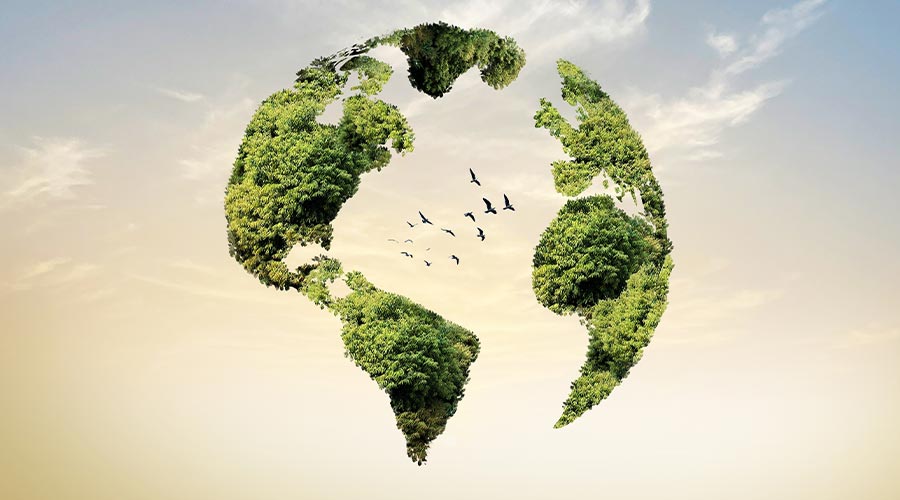
While validating sustainability claims involves a significant financial investment, ensuring authenticity builds trust and delivers long-term benefits for businesses and the planet.
“Many organizations in Europe drill down into environmental stewardship of the product and having that third-party validation is another trend we’re seeing,” notes Hartke.
Like the U.S., European countries award third-party certified ecolabels to products and services that meet certain environmental criteria. According to Steve Ashkin, president of The Ashkin Group, these certifications make it easier for purchasers to buy with confidence.
“Before making a statement about how great their product is, I hope every sales rep will take a moment to ensure they can back up their claims with reputable third-party verifications,” he says.
Ashkin shares that most consumers in the U.S. are not familiar with EU certifications, which is why it’s imperative for international companies selling products in the country to pursue U.S. third-party certifications as well. Manufacturers that claim U.S. certification is too expensive or difficult to pursue should raise a red flag.
“If a company has EU certification, then they already have all the data necessary to get certified in the United States; they don’t have to start from scratch,” Ashkin notes. “So, if they say they can’t afford to, I’d be concerned about doing business with them.”
Digital passports (DPPs) are another up-and-coming trend in Europe that will advance product traceability and sustainability. Linked to specific products via QR codes, these digital records provide detailed information about the product and its lifecycle. Ashkin believes it’s just a matter of time before digital passports make their way to the U.S.
“The EU is vastly ahead of the U.S. and increasingly so every day, so this is a good opportunity for distributors and manufacturers in the U.S. to learn from the EU,” he says. “A digital passport is a smart, inexpensive thing for them to adopt — and from a marketing perspective it’s an easy way to show leadership.”
An Economic Argument
One of the ways in which the EU is tackling waste is through regulations that promote product durability, recyclability and energy and resource efficiency. These include the Ecodesign for Sustainable Products Regulation (ESPR) and extended producer responsibility (EPR), a waste directive that mandates responsibility for the product’s lifecycle, particularly its end-of-life phase. Barklund notes that EPR will have a significant impact on product designs, especially those that use plastic and/or single-use plastic.
Dominique Machefert, owner of Eco-Life-Group, is a distributor in France who sells ozone water dispensers and chemical-free cleaning solutions. He acknowledges that the cleaning industry uses a lot of plastic, and the EU is aiming to curb its use and promote recycling.
Already, the EU single-use plastics directive (SUPD) has banned the sale of single-use plastics, such as straws, cutlery and plates. The directive also sets recycled content goals for certain plastic bottles. Machefert says that AGEC — a French law that targets waste and single-use plastics — helps him promote his business. The dispensers he sells produce cleaning solutions on site without generating plastic waste.
“Globally — and that includes the U.S. — plastic waste is something that distributors should look at,” Machefert says. “We don’t know what’s going to happen in the future, but if tomorrow, you are not able to sell products in single-use plastic, that could be a big problem for distributors.”
Meanwhile, companies like Bunzl in France are supporting a circular economy by providing customers with recycling logistics services, which includes recycling plastic containers used for cleaning chemicals. The country also implements regulations designed to safeguard water quality, including a system of taxation for large corporations whose wastewater contains excessive chemical concentrations.
While legislation can help distributors tout sustainable products and practices, the most compelling argument for embracing sustainability extends beyond compliance.
“Your business model should be based on sustainability — not because it’s a good thing to do to show that you care, but because in the long term it will be economical,” says Machefert. “If people take the time to understand how it works and invest in sustainable solutions now, at the end of this decade they will save money.”
Kassandra Kania is a freelance writer based in Charlotte, North Carolina, and is a frequent contributor to Sanitary Maintenance.
SIDEBAR: Talking Green at Interclean
Industry professionals from around the world will have the opportunity to continue the conversation about sustainability and its impact on cleaning and hygiene at Interclean Amsterdam, which takes place from April 14 to 17, 2026, in the Netherlands.
One of the highlights of this international trade show is the sustainability stage — a show floor staple that features continuous sustainability presentations covering a range of topics, from eco-conscious products to ESG reporting.
According to Interclean’s Director, Robert Stelling, the event will cover every sustainability trend in the cleaning industry.
“Many of the exhibitors will present sustainable solutions focusing on efficiency, circularity and renewable resources,” he says.
Beyond exploring the latest green cleaning products and services on the exhibit floor, attendees can leverage valuable networking opportunities with professionals at the forefront of sustainable innovation.
Click here to access more information and registration details.
How Green Directives Impact Jan/San in the U.S.

 Celebrating BSCAI's 60th Anniversary eBook
Celebrating BSCAI's 60th Anniversary eBook The Down and Dirty on Cleaning in Virus Season
The Down and Dirty on Cleaning in Virus Season How Surfactant Use is Expanding in Commercial Cleaning
How Surfactant Use is Expanding in Commercial Cleaning